 Petzlover
Petzlover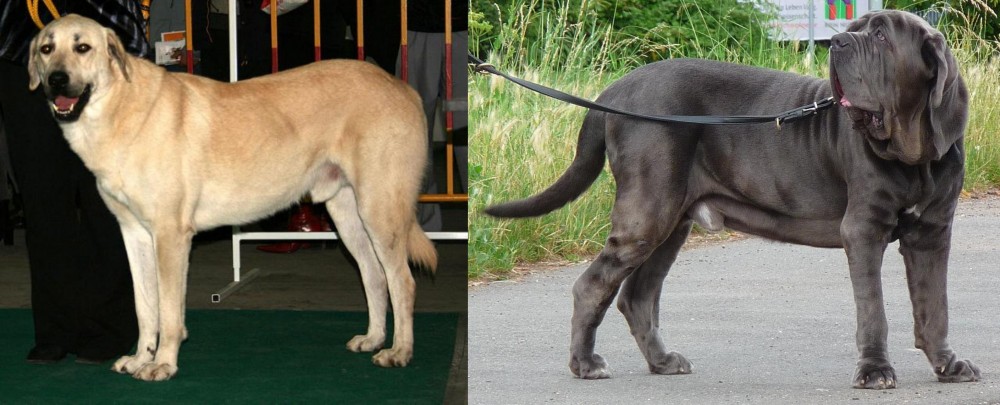 Central Anatolian Shepherd is originated from Turkey but Neapolitan Mastiff is originated from Italy. Central Anatolian Shepherd may grow 6 cm / 3 inches higher than Neapolitan Mastiff. Central Anatolian Shepherd may weigh 9 kg / 19 pounds lesser than Neapolitan Mastiff. Central Anatolian Shepherd may live 4 years more than Neapolitan Mastiff. Both Central Anatolian Shepherd and Neapolitan Mastiff has almost same litter size. Both Central Anatolian Shepherd and Neapolitan Mastiff requires Moderate Maintenance.
Central Anatolian Shepherd is originated from Turkey but Neapolitan Mastiff is originated from Italy. Central Anatolian Shepherd may grow 6 cm / 3 inches higher than Neapolitan Mastiff. Central Anatolian Shepherd may weigh 9 kg / 19 pounds lesser than Neapolitan Mastiff. Central Anatolian Shepherd may live 4 years more than Neapolitan Mastiff. Both Central Anatolian Shepherd and Neapolitan Mastiff has almost same litter size. Both Central Anatolian Shepherd and Neapolitan Mastiff requires Moderate Maintenance.
 The Central Anatolian Shepherd’s lineage is ancient, with the large dog originating from the Anatolia region of central Turkey. He has been used for guarding flocks against predatory wolves and has adapted to living in extreme weather conditions.
The Central Anatolian Shepherd’s lineage is ancient, with the large dog originating from the Anatolia region of central Turkey. He has been used for guarding flocks against predatory wolves and has adapted to living in extreme weather conditions.
The Turkish shepherds would put a spiked collar on the dog to protect him against predators going for the neck of the dog. Today the dog is still being used as a sheep dog and it is closely related to the Kangal Dog.
In 1965 the first pair of Anatolian Shepherds arrived in the UK. A pair were also provided by the Turkish prime minister to the United States government. Today he is a majestic dog still serving man. He is an Anatolian Shepherd Dog, a working dog breed, recognized by the American Kennel Club.
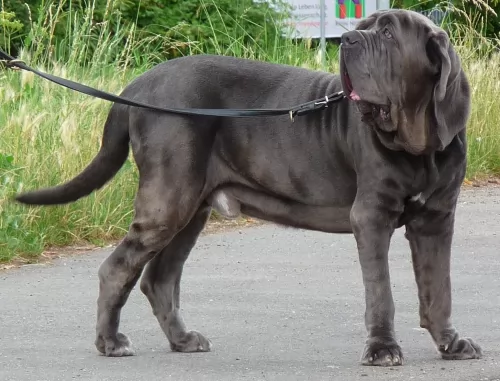 An ancient breed, the Neapolitan Mastiffs are massive dogs with a history of protecting their family and their property. The breed has deep rooted protective instincts and they are very frightening in appearance. The Neapolitan is of the Molosser group of dogs, all of whom probably came from the same line. It is known that all the mastiffs in Europe are descendants of the Tibetan Mastiff. The Tibetan Mastiff is considered the most ancient of all canines.
An ancient breed, the Neapolitan Mastiffs are massive dogs with a history of protecting their family and their property. The breed has deep rooted protective instincts and they are very frightening in appearance. The Neapolitan is of the Molosser group of dogs, all of whom probably came from the same line. It is known that all the mastiffs in Europe are descendants of the Tibetan Mastiff. The Tibetan Mastiff is considered the most ancient of all canines.
The Asian Mastiffs came from India to Greece around 300 BC with Alexander the Great. Then the breed was brought to the Romans by the Greeks and then introduced them in their circus in fights. Another possibility is that around 500 BC the mastiffs came to Britain from the Phoenicians. Either way the Roman Molossus is the ancestor of the Neapolitan Mastiff.
The Romans crossed the breed with the English Mastiff around 55 BC and developed a premiere war dog that was called a Mastini.
The breed eventually became extinct in Europe with the exception of Campania. The breed was recognized in 1946 with the standard accepted in 1949. However, it is believed that the Neapolitan Mastiff has been continuously present in Campania for over two thousand years. The breed was initially developed as war dogs and for the Roman coliseum spectacles.
In 1946 Dr. Piero Scanziani established a program to breed them in Italy. He wrote the breed standard in 1949.
Today the Neo is a farm dog, an army dog, a police dog and a guard dog. They were shown in Italy for the first time in 1946 but only in 2004 was the breed recognized by the American Kennel Club (AKC). It was 1973 when the Neapolitan Mastiff Club of America was born and 1996 when the standard was approved by the AKC. They are still a rare breed in the United States.
 The Central Anatolian Shepherd is a large,impressive looking dog that possesses great strength, endurance and agility. He is beautiful to look at and is well muscled and strong.
The Central Anatolian Shepherd is a large,impressive looking dog that possesses great strength, endurance and agility. He is beautiful to look at and is well muscled and strong.
He stands at roughly 66-76 cm and weighs 40 to 70kg. The head is large and strong, but in good proportion with the rest of the dog’s body. He has brown eyes and his ears are floppy. The tail is long and set high and when the dog is alert, the tail is carried high, making a wheel shape, otherwise the tail is held low, curling up at the tip.
The short to medium length coarse coat is essentially fawn colored and the dog has a black mask. With the dog, early training and socialization will be needed as he is a strong, stubborn, dominant breed who will require firm leadership from his human owners.
The Central Anatolian Shepherd Dog is a loyal guard dog that becomes possessive over his flock, his human family and anything that he regards as his property. He is aloof around strangers, being suspicious of them.
He will require a firm, positive owner who provides training and socialization. He is an affectionate family pet and gets on well with children who have been taught how to treat dogs and other animals with care and respect. This is a bold, confident dog without aggression who is intelligent, proud and independent.
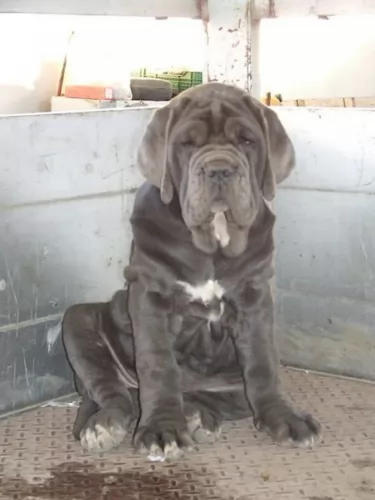 The Neapolitan Mastiff is a massive dog , so powerful and very intimidating in his looks. With an incredibly large head and hanging folds and wrinkles, the Neo is an impressive animal. His inner nobility and dignity is evident in his stance and the way he holds himself. He is relaxed, calm, quiet yet imposing none the less. His coat is dark whether black, tawny, gray or mahogany. He is muscular beyond imagination. The Neo is 10-15% longer than he is tall.
The Neapolitan Mastiff is a massive dog , so powerful and very intimidating in his looks. With an incredibly large head and hanging folds and wrinkles, the Neo is an impressive animal. His inner nobility and dignity is evident in his stance and the way he holds himself. He is relaxed, calm, quiet yet imposing none the less. His coat is dark whether black, tawny, gray or mahogany. He is muscular beyond imagination. The Neo is 10-15% longer than he is tall.
On his massive head his eyes are deep set and covered by his eye lids that droop. His eyes are blue as puppies then dark and coordinated with his coat. and his nose is large and the color of his coat. Ears are natural or can be cropped, and they carry their tail straight and curving back. The Neo has round paws and arched toes.
 The large, rugged Anatolian Shepherd is a dog that has been developed essentially to work as a guardian of livestock. He is a dignified, calm kind of dog who is fiercely possessive of those he guards. He is independent and will require a firm, assertive owner.
The large, rugged Anatolian Shepherd is a dog that has been developed essentially to work as a guardian of livestock. He is a dignified, calm kind of dog who is fiercely possessive of those he guards. He is independent and will require a firm, assertive owner.
He won’t enjoy lying around the home with nothing to do. These are dogs who like to be busy, and therefore he is more a country-life dog than being found in the city on a small property. Make sure that if your pet hasn’t got a working role, that he is provided with exercise, although as a large dog, he isn’t particularly playful and doesn’t require loads of exercise.
Provide him with a caring, loving home and this large, beautiful dog will become your loyal and devoted friend who will guard you with his life.
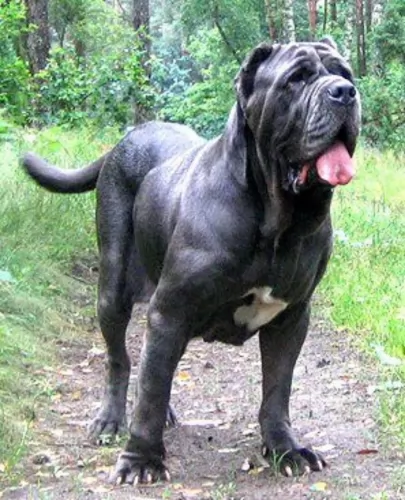 Older children in their family. No toddlers or strangers.
Older children in their family. No toddlers or strangers.
Protective yet quiet, calm, relaxed
No they won’t adapt well to apartment living or to strangers.
They are intelligent and trainable but must be socialized and know the human is the alpha or they will take over.
 The Anatolian Shepherd Dog is a hardy, healthy dog who isn’t likely to get sick easily. The dog can live to be 11, 12, 13 years of age when he receives excellent care. Like any pure breed though, he is susceptible to hereditary disorders and some of the other common health issues.
The Anatolian Shepherd Dog is a hardy, healthy dog who isn’t likely to get sick easily. The dog can live to be 11, 12, 13 years of age when he receives excellent care. Like any pure breed though, he is susceptible to hereditary disorders and some of the other common health issues.
This condition is always a problem with a big dog. It’s an abnormal development of the hip joint and it can cause lameness and painful arthritis of the joints. It is brought about by a combination of environmental- as well as genetic factors.
This is a common type of blood cell cancer diagnosed in dogs. Lymphoid tissue is present in quite a few places in the body including lymph nodes, liver and spleen, and dogs of any age can be affected.
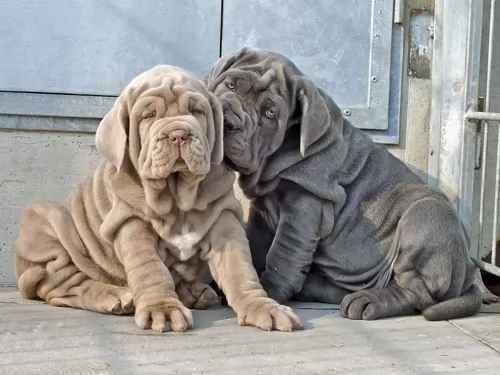 The Neapolitan Mastiff is prone to many of the same issues as any massive, extra large breed. The most common of these is Cherry Eye.
The Neapolitan Mastiff is prone to many of the same issues as any massive, extra large breed. The most common of these is Cherry Eye.
 The Central Anatolian Shepherd sheds fairly heavily so he will require brushing at least twice a week. Grooming is important and won’t only include brushing, but ear cleaning and nail trimming too as well as proper dental hygiene.
The Central Anatolian Shepherd sheds fairly heavily so he will require brushing at least twice a week. Grooming is important and won’t only include brushing, but ear cleaning and nail trimming too as well as proper dental hygiene.
A dog such as the Anatolian Shepherd, with his floppy ears, will also need to have his ears checked and cleaned to avoid ear infections. There are some of these dogs where the hair needs to be plucked from the ear canal to ensure proper air circulation.
It is important that you are skilled to clean the ears properly, and if in any doubt, to avoid damage to the ear, consult your vet for sound advice.
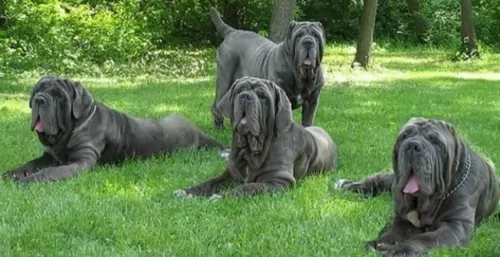 Neapolitans grow fast and so don’t overfeed when they are young. Lower protein and higher fat content.
Neapolitans grow fast and so don’t overfeed when they are young. Lower protein and higher fat content.
Don’t overfeed the adult as they can become obese.
This big hearty breed needs exercise but not too much. They overheat easily. The puppy will push himself, so you have to make sure he doesn’t over do it. No tug of war games. They need a long walk twice every day.